#Django app Development
Explore tagged Tumblr posts
Text
Django Web Framework: The Ultimate Guide to Web Application Development
The demand for powerful, scalable, and secure web applications has never been higher. With numerous frameworks available, choosing the right one can be overwhelming. Django, a high-level Python web framework, has emerged as one of the most reliable choices for developers worldwide. It simplifies web development by providing built-in features for authentication, database management, and security.
What is Django Web Framework?
Django web framework is an open-source framework designed to facilitate rapid development while maintaining clean and pragmatic design principles. Built on Python, it promotes reusability and follows the Model-View-Template (MVT) architecture. This structure allows developers to separate concerns effectively, making it easier to manage complex applications. The framework includes pre-built components that help reduce development time while maintaining high-security standards.
Why Choose Django for Web Development?
Django provides numerous advantages, making it an ideal choice for web development. It includes an automatic admin interface, robust security features, scalability, and extensive documentation. Additionally, Django eliminates repetitive coding by offering built-in solutions, allowing developers to focus on building applications rather than configuring underlying infrastructure.
Getting Started with Django App Development
When starting with Django app development, developers first need to set up a virtual environment and install Django. The framework offers a simple command-line tool to create new projects and applications quickly. Django’s modularity allows developers to break applications into smaller, reusable components, making maintenance easier. The framework also supports multiple database backends, including PostgreSQL, MySQL, and SQLite, providing flexibility based on project requirements.
Key Features of Django
Scalability – Django is designed to handle high-traffic applications efficiently.
Security – It includes built-in protection against SQL injection, XSS, and CSRF attacks.
Rapid Development – Developers can build applications faster with less code.
Extensive Libraries – A vast ecosystem of third-party packages enhances functionality.
Versatility – Suitable for various applications, from content management systems to data-driven applications.
Understanding Django Web Development Process
Django web development follows a systematic approach, ensuring efficiency and maintainability. The process typically includes:
Project Setup: Installing Django and configuring the project structure.
Model Creation: Defining database models using Django’s ORM (Object-Relational Mapping).
View Implementation: Handling logic and processing user requests.
Template Design: Creating dynamic and responsive HTML pages.
Testing and Deployment: Using Django’s built-in testing tools before deploying to production.
Developers also leverage Django’s middleware, authentication system, and caching mechanisms to optimize performance. The framework’s support for RESTful APIs makes it an excellent choice for integrating with front-end frameworks like React and Angular.
Building a Scalable Django Web Application
Django web application development focuses on creating robust, maintainable, and scalable projects. Best practices include:
Structuring the project efficiently using Django’s modular approach.
Using Django’s built-in authentication and permission system for security.
Implementing caching mechanisms to enhance application speed.
Deploying applications using platforms like AWS, Heroku, or DigitalOcean.
Maintaining proper documentation and writing unit tests to ensure reliability.
Learn Django with Removeload Educational Academy
At Removeload Educational Academy, we provide a free online e-learning tutorial portal designed to make learning programming languages easy and accessible. Our step-by-step tutorials offer live examples, making it simple for students to understand Django’s core concepts. Whether you're a beginner or an experienced developer, our tutorials help you master Django web development efficiently.
Django remains a top choice for modern web development, thanks to its flexibility, security, and ease of use. If you want to build a scalable and high-performance web application, Django is the perfect framework to get started with. Join Removeload Educational Academy today and take the first step toward mastering Django!
0 notes
Text
#Backend Developers#Backend Development#Hire Django Developers#Reasons Django with Python#Python App Development#Python Web Development#Django app Development#django development#Mobile App Development Company#Web Development Company#Enterprise Development Company
0 notes
Text

At Adequate Infosoft, we are a dedicated team of passionate developers specializing in creating robust and scalable web applications using Django app development, the Python web framework. With years of experience in the field, we have successfully delivered innovative solutions to clients across various industries.
0 notes
Text
LiftMore Update 9.04.2023
I was posting updates on my Medium (see the pinned post), but lately I haven't had time to make a thorough post. Instead, I want to update on a few things in a more informal post here.
API Updates
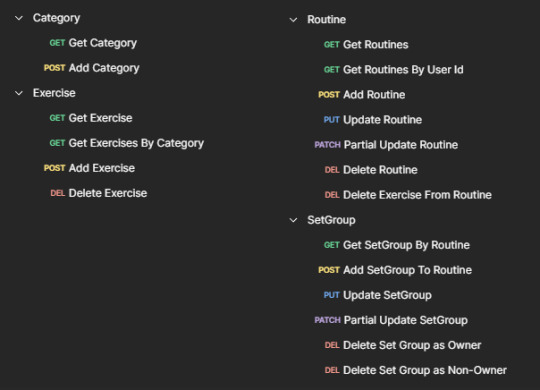
Finally went through and added all of the endpoints I'll need. There are a few endpoints on this list that I'm still in the process of refining permissions and making more secure.
Unit Testing ...ayup.. I came this far into the project without writing a single unit test. I really do want to strive for best TDD practices, but when there's no code at all in my application, it feels really unsatisfying to start working on tests before my code is capable of doing anything. Moving forward in the project, I will definitely strive to do TDD well.
Security Currently, the API just processes users via Basic Authentication. In this upcoming week, I'm planning on creating an identity server and using that server to issue my own OAuth2.0 tokens. I'm not sure yet how I want to set up my IDP service and OIDC Identity Providers.
Deployments Before moving onto the Front-End for this project, I want to make sure that my app is as secure and robust as possible. For this, I want to create 3 different environments (Development, Test, and Production), use a secret manager to inject secrets into the application, and have all of my deployments automated with GitHub Actions. In addition to all this, I want to make sure my application is set up properly between GitHub Actions and AWS so that I can manage dashboards and collect usage/cost information before having any users.
Finally, I'm happy to say that I've acquired the domain name "liftmore.app". After I get through some of the things I mentioned here, I'll push out a landing page and more information of LiftMore from a user perspective in case anybody wants to use it :)
Lastly, little brief preview of my Project board in GitHub at the moment.
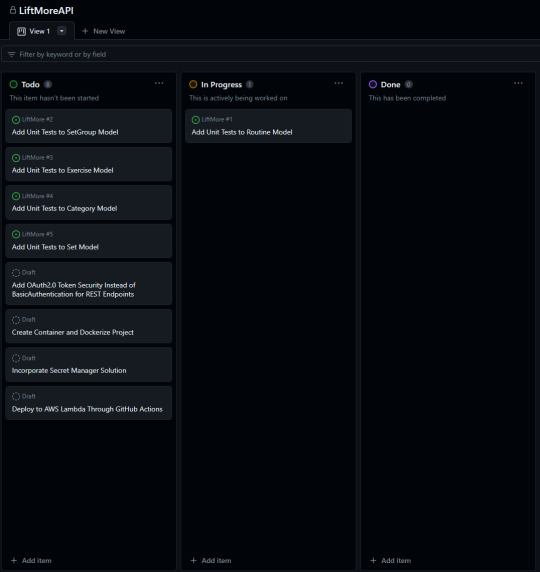
8 notes
·
View notes
Text
Ultimate Guide to Choosing Between Laravel and Django for Your Next Web App
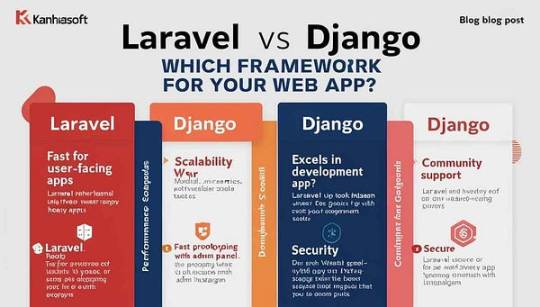
Building a web application is no small feat. It’s like assembling a spaceship — every component matters, and choosing the wrong framework can send your project into a black hole. At Kanhasoft, we’ve spent years crafting custom software solutions that feel like a secret superpower for our clients. Two of our favorite tools? Laravel and Django, the rockstars of web development frameworks. But which one is the best framework for your web app? Spoiler: there’s no one-size-fits-all answer, but we’re here to break it down so you can make an informed choice.
Whether you’re a startup dreaming of the next big app or an enterprise streamlining operations, this guide will compare Laravel vs Django across performance, scalability, security, and more. Let’s dive into the nitty-gritty and help you pick the perfect framework for your next project.
Why Laravel and Django? The Heavyweights of Web Development
Laravel (PHP-based) and Django (Python-based) are battle-tested frameworks loved by developers and businesses alike. Both power robust, scalable web apps, but they cater to slightly different needs. At Kanhasoft, a software development company with expertise in both, we’ve built everything from eCommerce platforms to data-heavy enterprise systems using these tools. So, why are they so popular?
Laravel: Known for its elegant syntax and rapid development, Laravel is a PHP framework that makes building feature-rich apps a breeze. It’s packed with tools like Eloquent ORM, Blade templating, and built-in authentication.
Django: The Python-powered Django is all about “batteries included,” offering a full-stack ecosystem with ORM, admin panels, and security features out of the box. It’s a favorite for data-driven and rapid-prototyping projects.
Performance: Speed That Keeps Up with Your Ambition
When it comes to performance, both Laravel and Django deliver, but their strengths differ. Laravel, built on PHP, shines in environments with high user traffic, like eCommerce platforms. Its caching tools (e.g., Redis, Memcached) and optimization features ensure snappy response times. At Kanhasoft, we’ve used Laravel to build custom software for marketplaces that handle thousands of transactions daily without breaking a sweat.
Django, on the other hand, leverages Python’s efficiency and excels in CPU-intensive tasks, like data processing or machine learning integrations. Its asynchronous capabilities (introduced in Django 3.1) make it a strong contender for real-time apps. For example, we’ve powered Django web development projects with complex analytics dashboards that crunch numbers in milliseconds.
Verdict: Choose Laravel for user-facing apps with heavy traffic. Go with Django for data-heavy or computation-intensive projects. Need both? A software development company like Kanhasoft can blend their strengths with microservices.
Scalability: Growing Without the Growing Pains
Scalability is where your web app proves it can handle success. Laravel’s modular structure and support for microservices make it a go-to for apps that need to scale horizontally. Think of platforms like Airbnb or Uber — Laravel’s ecosystem (with tools like Laravel Vapor) can support massive user bases. We’ve built scalable Laravel apps at Kanhasoft that seamlessly grew from MVP to enterprise-grade solutions.
Django’s scalability is equally impressive, thanks to its clean architecture and Python’s versatility. Companies like Instagram and Pinterest run on Django, proving it can handle billions of requests. Django’s ability to integrate with cloud platforms (e.g., AWS, Google Cloud) makes it ideal for startups planning to scale fast. Our custom software projects often use Django for rapid prototyping that evolves into robust systems.
Verdict: Both frameworks scale well, but Laravel is better for modular, user-centric apps, while Django suits data-driven, cloud-native systems. Let’s explore another critical factor: development speed.
Development Speed: From Vision to Victory
Time-to-market is a make-or-break factor for startups and enterprises alike. Laravel’s developer-friendly features — like pre-built authentication, routing, and Artisan CLI — accelerate development. Its vibrant community and packages (via Composer) mean you’re never starting from scratch. At Kanhasoft, we’ve used Laravel to deliver custom software in record time, empowering clients to launch ahead of competitors.
Django’s “batteries included” philosophy gives it an edge for rapid prototyping. Its built-in admin panel, form handling, and ORM let developers focus on business logic rather than boilerplate code. For Django web development, we’ve built MVPs in weeks, complete with admin dashboards that clients love tweaking themselves.
Verdict: Laravel is faster for feature-rich apps with complex frontends. Django wins for quick prototypes and data-heavy backends. Your timeline and team’s expertise will tip the scales.
Security: Keeping Your App Fortified
In today’s world, a single security breach can sink your app’s reputation. Laravel and Django both prioritize security, but their approaches differ. Laravel offers built-in protections like CSRF tokens, XSS prevention, and secure authentication. Its regular updates and active community keep vulnerabilities at bay. We’ve used Laravel to build secure eCommerce platforms that handle sensitive payment data with ease.
Django is a security powerhouse, with features like SQL injection prevention, CSRF protection, and automatic escaping of HTML. Its “secure by default” mindset makes it a favorite for industries like healthcare and finance. At Kanhasoft, our Django web development projects often include custom security layers for enterprise clients.
Verdict: Both are secure, but Django’s out-of-the-box protections make it slightly easier for beginners to avoid pitfalls. Laravel’s flexibility suits teams with strong security expertise.
Community and Ecosystem: Support That Powers Progress
A framework’s community can be your lifeline during development. Laravel’s ecosystem is massive, with thousands of packages on Packagist and a thriving community on forums like Laracasts. Need a payment gateway or API integration? Laravel’s got you covered. Our team at Kanhasoft leans on Laravel’s ecosystem to deliver custom software tailored to unique client needs.
Django’s community, while smaller, is equally passionate. Python’s vast ecosystem (e.g., libraries like NumPy, Pandas) makes Django a powerhouse for AI and data-driven apps. The Django REST Framework is a game-changer for API development, and we’ve used it to build seamless integrations for clients.
Verdict: Laravel’s ecosystem is broader for web app features, while Django’s Python roots give it an edge for AI and analytics. Choose based on your app’s niche requirements.
Kanhasoft’s Take: Making Technology Your Superpower
At Kanhasoft, we believe technology should feel like a secret superpower. Whether you choose Laravel or Django, our software development company can turn your vision into reality. Laravel’s elegance powers our eCommerce and marketplace projects, while Django’s versatility drives our AI and ERP solutions. Can’t decide? We’ve even combined both in microservices architectures for clients who want the best of both worlds.
Here’s the thing: the best framework for your web app depends on your goals. If you’re building a user-facing platform with complex features, Laravel’s speed and flexibility are hard to beat. If your app leans on data processing, AI, or rapid prototyping, Django’s ecosystem is your ally. Either way, partnering with a software development company like Kanhasoft ensures your app is built to succeed.
FAQs About Laravel vs Django
Q1: Which is better for startups, Laravel or Django? A: Laravel is ideal for startups needing feature-rich apps with quick market entry, thanks to its rapid development tools. Django suits startups focused on data-driven MVPs or AI integrations, offering fast prototyping and scalability.
Q2: Is Django more secure than Laravel? A: Both are secure, but Django’s “secure by default” features (e.g., automatic SQL injection prevention) make it slightly easier for beginners. Laravel offers robust security with proper configuration, ideal for experienced teams.
Q3: Can Laravel and Django be used together? A: Yes, in a microservices architecture. For example, Kanhasoft has built apps using Laravel for the frontend and Django for data-heavy backends, ensuring the best of both worlds.
Q4: Which framework is faster for web app development? A: Laravel accelerates development for complex, user-facing apps with tools like Artisan. Django is faster for prototypes and data-driven apps due to its built-in admin and ORM.
Q5: How do I choose the best framework for my web app? A: Consider your project’s goals, team expertise, and timeline. Laravel suits eCommerce or modular apps; Django excels in analytics or AI-driven projects. Consult a software development company like Kanhasoft for tailored advice.
Conclusion: Your Web App, Your Superpower
Choosing between Laravel and Django isn’t about picking a winner — it’s about finding the framework that makes your web app a powerhouse. At Kanhasoft, we’ve seen both frameworks transform ideas into reality, from sleek marketplaces to intelligent ERP systems. As a software development company, our mission is to make technology feel effortless, like a superpower you wield with confidence.
So, what’s your next step? Evaluate your project’s needs, weigh the strengths of Laravel vs Django, and let your vision guide you. Better yet, reach out to Kanhasoft for a free consultation. We’ll help you choose the best framework for your web app and build custom software that sets you apart. Let’s make your app the hero of your story — contact us today!
0 notes
Text
Flask vs. Django: Is One Better Than the Other?
Flask vs. Django are two frameworks that are based on Python, a renowned programming language best known for its quick scalability and adaptability. Both frameworks offer tremendous convenience for building efficient web apps.
Django and Flask have a strong community of developers. Moreover, Flask carrying 56.6k and Django with 59.6k stars on GitHub indicates how close their reputations are. This begs an intuitive question: Flask vs. Django, which is better?
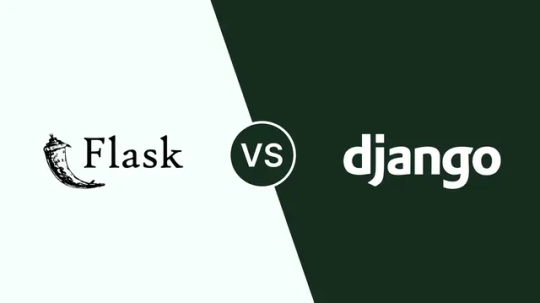
0 notes
Text

When hiring Django coders, look for proficiency in Python, deep knowledge of Django, experience with RESTful APIs, strong database management skills, and expertise in version control tools.
#Hire Django Developers#Hire Remote Django developers#Hire Django Programmers#Hire Django Experts#Django Development Services#Hire the best Django developers#Hire Django coders#Hire Django consultant#Django Website Development#Django Mobile App Development#Best Django development company#Hire Dedicated Django Developers
0 notes
Text
Flask vs Django: Delving into Features, Ecosystem, and Community Support
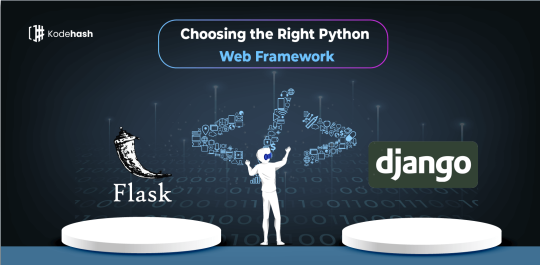
Flask and Django are two popular Python web frameworks that offer developers powerful tools for building web applications. While both frameworks are widely used in the development community, they have distinct features, ecosystems, and levels of community support. In this article, we will delve into the features, ecosystem, and community support of Flask and Django to help you understand their differences and choose the right framework for your project.
Features:
Flask:
Flask is a lightweight and minimalist web framework known for its simplicity and flexibility. Some key features of Flask include:
Minimalistic Design: Flask follows a micro-framework approach, providing developers with only the essential tools for web development.
Extensibility: Flask allows developers to extend its functionality with various extensions and third-party libraries, enabling them to add features as needed.
URL Routing: Flask provides a simple and intuitive mechanism for defining URL routes and mapping them to view functions.
Jinja2 Templating: Flask comes with built-in support for the Jinja2 templating engine, allowing developers to create dynamic HTML templates easily.
Built-in Development Server: Flask includes a built-in development server for testing and debugging applications locally.
Django:
Django is a full-stack web framework that follows the "batteries included" philosophy, providing developers with a comprehensive set of built-in features and tools. Some key features of Django include:
Admin Interface: Django includes a powerful admin interface that allows developers to manage site content, users, and permissions out of the box.
ORM (Object-Relational Mapping): Django's ORM simplifies database interactions by abstracting away SQL queries and providing a high-level API for working with database models.
Authentication and Authorization: Django provides built-in support for user authentication, session management, and role-based access control.
Form Handling: Django's form handling capabilities make it easy to validate and process user input, reducing the complexity of form handling in web applications.
Built-in Security Features: Django includes built-in security features such as protection against common web vulnerabilities like CSRF (Cross-Site Request Forgery) and XSS (Cross-Site Scripting) attacks.
Ecosystem:
Flask:
Flask has a vibrant ecosystem with a wide range of extensions and third-party libraries that extend its functionality. Some popular Flask extensions include Flask-SQLAlchemy for database integration, Flask-RESTful for building RESTful APIs, Flask-WTF for form handling, and Flask-Login for user authentication.
Django:
Django's ecosystem is highly mature and extensive, with a vast array of reusable components, packages, and plugins available. The Django Packages website lists thousands of third-party packages categorized by functionality, including authentication, content management, e-commerce, and more. Some popular Django packages include Django REST Framework for building APIs, Django CMS for content management, and Django-allauth for authentication and social login integration.
Community Support:
Flask:
The Flask community is active and supportive, with a large number of developers contributing to the framework's development and maintenance. Flask has a dedicated website (https://flask.palletsprojects.com/) with comprehensive documentation, tutorials, and community forums where developers can seek help and share their knowledge.
Django:
Django boasts a thriving community with a wealth of resources and support available to developers. The official Django website (https://www.djangoproject.com/) provides extensive documentation, tutorials, and a community forum where developers can ask questions, share their experiences, and collaborate on projects. Additionally, DjangoCon, the annual conference for Django developers, brings together enthusiasts from around the world to learn, network, and contribute to the framework's growth.
Conclusion:
Flask and Django are both powerful web frameworks with unique features, ecosystems, and levels of community support. Flask's minimalist design and flexibility make it ideal for small to medium-sized projects or projects that require a high degree of customization. On the other hand, Django's comprehensive set of built-in features and mature ecosystem make it well-suited for rapid development and large-scale applications. By understanding the features, ecosystem, and community support of Flask and Django, developers can make an informed decision and choose the framework that best fits their project requirements and development preferences.
0 notes
Text
Confused between Django vs React? Check Inwizards Technology detailed article covering difference, advantages and challenges of using.
#django#Django vs React#web development company#web development services#web app development#web development#inwizards software technology#mobile app development#software development service
0 notes
Text
Exploring the Popularity of Custom Python Development Services in 2023

In the ever-evolving landscape of technology, Python has firmly established itself as a versatile and powerful programming language. As we step into 2023, the demand for custom Python development services is reaching new heights, and businesses are increasingly turning to Python for their software development needs. In this blog post, we'll delve into the reasons behind the growing popularity of custom Python development services in 2023.
1. Versatility and Readability
Python's simplicity and readability have been its hallmarks since its inception. In a fast-paced development environment where time-to-market is crucial, Python's clean syntax allows developers to write code more quickly and efficiently. This versatility makes Python an ideal choice for custom development projects, ranging from web applications to data science and artificial intelligence.
2. Data Science and Machine Learning Dominance
Python's dominance in the fields of data science and machine learning has been a driving force behind its increasing popularity. The abundance of libraries and frameworks, such as NumPy, Pandas, TensorFlow, and PyTorch, empowers developers to build robust and scalable machine learning solutions. As businesses continue to harness the power of data, the demand for Python developers skilled in these domains is skyrocketing.
3. Web Development Frameworks
Frameworks like Django and Flask have solidified Python's position in web development. Django, a high-level web framework, simplifies the process of building web applications, while Flask offers a lightweight and modular approach. Both frameworks contribute to the surge in Python's popularity for developing custom web solutions.
4. Open communities and Rich ecosystems
Python's open-source nature has fostered a vibrant and supportive community. The availability of a vast ecosystem of libraries, packages, and tools makes Python development even more attractive. Developers can leverage existing solutions, accelerating the development process and reducing costs.
5. Cross-Platform Compatibility
Python's cross-platform compatibility ensures that applications developed in Python can run seamlessly on various operating systems. This flexibility is a significant advantage, especially in a business environment where diverse platforms are in use.
6. Scalability and Maintainability
As businesses grow, so does the need for scalable and maintainable software solutions. Python's design principles emphasize code readability, simplicity, and modularity, making it easier for developers to maintain and scale applications over time.
Conclusion
In 2023, the demand for custom Python development services is flourishing, propelled by the language's versatility, its leading role in data science and machine learning, and strong web development frameworks.
As businesses actively pursue effective and potent solutions, Python stands out as a preferred option for custom software development.
Umanologic, recognized as the top Python development company in Edmonton, Canada, is contributing significantly to this trend. With their expertise and commitment to excellence, Umanologic is at the forefront of delivering tailored Python solutions, meeting the evolving needs of businesses in the realm of software development.
#python development company#python mobile app development edmonton#django web development#Django Development Company in canada#python development services
0 notes
Text
#html#css#javascript#code#programming#language#development#tech#stack#web#app#servers#database#databases#django#mysql#sql#php#python
0 notes
Text
Python-Django Training and Placements by DOCC Kolkata
Python-Django and JavaScript-Angular training classes starting in December 2023. This could be a great opportunity for individuals interested in AI, Machine Learning, Data Science, Deep Learning, Finance and Trading, System Automation, Computer Graphics, and Android App Development. For those interested in joining these classes, it's essential to contact the provided phone number (94335-26196) and visit the website www.docckolkata.com for further details, including course schedules, fees, and registration processes. Please make sure to reach out to the mentioned contact information to get all the necessary information and updates about the classes.
#career training in kolkata#placements#youtube#live projects#php training#python#laravel training#career#jobs#career counseling kolkata#django#android app development#mobile app development company
0 notes
Text
PHP-My SQL-Laravel Training and Placements by DOCC Kolkata
This is a great opportunity for anyone looking to dive into PHP, MySQL, Laravel, or web design! Are you thinking of joining one of those courses? PHP-MY SQL-LARAVEL Training Course new batch with Projects for assured PLACEMENTS are going to start by 12-30 PM, as on 17th December, 23, Sunday at DOCC Kolkata Center, Lake Gardens. Admission going on. If interested please contact 9433526196 / Web: www.docckolkata.com
#coding#php#laravel#php programming#php training#phpwebsitedevelopment#php framework#placements#training#angular#python#django#mobile app development company#android app development
0 notes
Text
MarsDevs' Introduction to Django Querying Simplified
Want to know more about Django Querying? Check out our introduction to Django Querying, a powerful tool that simplifies database querying for your Django project. Through this article, MarsDevs will help you understand the different ways of querying in Django, as, at the start, it might look and feel quite complicated.
0 notes
Text
Python & Django Fullstack Development Course in india
In the ever-evolving landscape of technology, fullstack development has emerged as the key to creating dynamic web and mobile applications. The demand for skilled developers is on the rise, and the Python & Django Fullstack Development Course in India, offered by Qubycles.com, is your ticket to success.
The Indian tech industry is booming, and so is the demand for skilled app developers. App development courses in India are the gateway to a world of opportunities. Qubycles.com's Python & Django Fullstack Development Course is tailored to meet the specific demands of the industry, ensuring that you are well-equipped to excel in the competitive job market.
0 notes
Text

Django Development Services ensure secure web applications with robust built-in protections, encryption, authentication, and regular updates.
#Hire Django Developers#Hire Remote Django developers#Hire Django Programmers#Hire Django Experts#Django Development Services#Hire the best Django developers#Hire Django coders#Hire Django consultant#Django Website Development#Django Mobile App Development#Best Django development company#Hire Dedicated Django Developers
0 notes